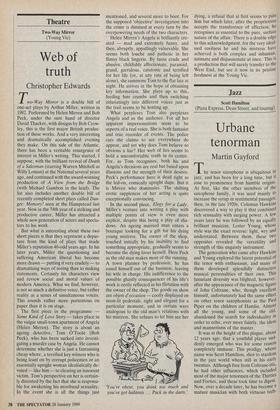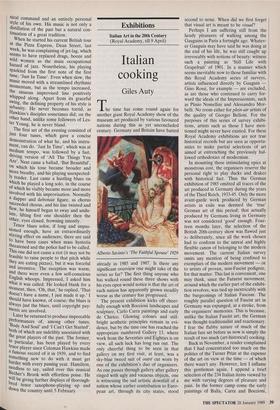jazz
Scott Hamilton (Pizza Express, Dean Street, and touring)
Urbane tenorman
Martin Gayford
The tenor saxophone is ubiquitous in jazz, and has been for a long time, but it rose to prominence from humble origins. At first, like the other members of the saxophone family, it was used mainly to increase the syrup in sentimental passages; then, in the late 1920s, Coleman Hawkins discovered a way to play it that combined rich sensuality with surging power. A few years later he was followed by an equally brilliant musician, Lester Young, whose style was the exact reverse: light, wry and understated. Between them, these two opposites revealed the versatility and strength of this ungainly instrument.
The generation who came after Hawkins and Young explored the latent potential of the tenor with enthusiasm, and many of them developed splendidly distinctive musical personalities of their own. This luxuriant diversity was blighted, however, after the appearance of the magnetic figure of John Coltrane, who, though excellent himself, unfortunately had the same effect on other tenor saxophonists as the Pied Piper on the children of Hamlin. Almost all the young, and some of the old, abandoned the search for individuality in order to echo, ever more faintly, the ideas and mannerisms of the master.
It was at the height of this plague, about 12 years ago, that a youthful player sud- denly emerged who was for some reason completely immune. This prodigy, whose name was Scott Hamilton, shot to stardom in the jazz world when still in his early twenties. Although free from Coltrane-ins, he had other influences, which included most of the major tenormen of the Thirties and Forties, and these took time to digest. Now, over a decade later, he has become a mature musician with both virtuoso tech- Weal command and an entirely personal style of his own. His music is not only a distillation of the past but a natural con tinuation of a great tradition. When he started his current British tour at the Pizza Express, Dean Street, last week, he was complaining of jet-lag, which seems to have replaced drugs, booze and Wild women as the main occupational hazard of jazz. Nonetheless, his playing sparkled from the first note of the first tune, 'Just In Time'. Even when slow, the music moved with a streamlined rhythmic momentum, but as the tempo increased, the sinuous improvised line positively whipped along. Apart from its graceful swing, the defining property of his style is urbanity. He never becomes torrid, as Hawkins's disciples sometimes did; on the other hand, unlike some followers of Les- ter Young, he is never bland. The first set of the evening consisted of just four tunes, which gave a concise demonstration of what he, and his instru- ment, can do. 'Just In Time', which was at medium tempo, was followed by a fast, driving version of 'All The Things You Are'. Next came a ballad, 'But Beautiful', on which his tone became broader and more breathy, and his playing unexpected- ly tender. Last came a hustling blues on which he played a long solo, in the course of which he visibly became more and more involved with his improvisation. Normally a dapper and debonair figure, as chorus succeeded chorus, and his line twisted and flew, he himself began to sway and undu- late, lifting first one shoulder then the other, eyes closed, frowning intently. Tenor blues solos, if long and impas- sioned enough, have an extraordinarily stirring effect on audiences; there are said to have been cases when mass hysteria threatened and the police had to be called. This one did not cause a riot (it may not be feasible to raise people to that pitch while they are eating pizzas), but it was forceful and inventive. The reception was warm, and there were even a few self-conscious English whoops. Impressed, I asked him what it was called. He looked blank for a moment, then, 'Oh, that,' he replied, 'That doesn't have a name, I just made it up.' I should have known, of course: the blues is always just the blues, until copyright pay- ments are involved.
Later he returned to produce impeccable performances of, among other tunes, Body And Soul' and 'I Can't Get Started', both of which are indelibly associated with the great players of the past. The former, in particular, has been played by every tenor player since Coleman Hawkins made a famous record of it in 1939, and to find something new to do with it must get harder with every passing year. Hamilton, needless to say, sailed over this musical Becher's Brook with effortless poise. He Will be giving further displays of thorough- bred tenor saxophone-playing up and down the country until 5 February.


















































 Previous page
Previous page